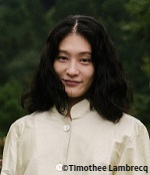Inner Diversity <2>
An interview with artist KOM_I
A Wanderer
October 24, 2022
[Special Feature 076]
Special Feature: Inner Diversity (See here for an overview of this special feature)
KOM_I is an artist active in a plethora of fields and communities. In addition to her genre-bending creative endeavors, she also studies world music and folk arts, and frequently interacts with immigrants living in Japan. We interviewed KOM_I on what inner diversity means to her, and what she values in her relationships with others.
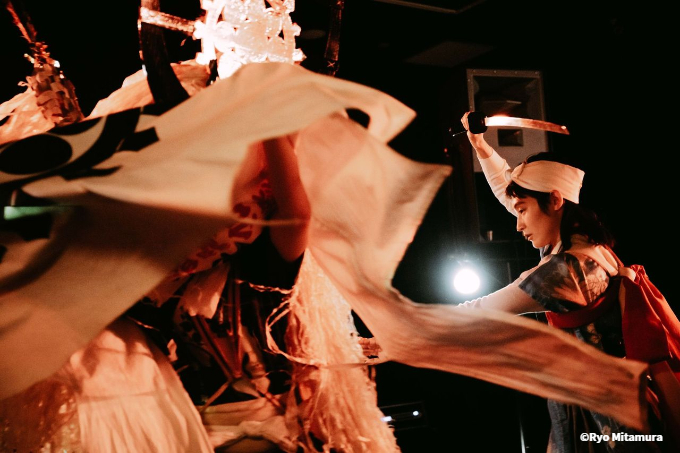
- ── I notice you have a lot of posts to do with traditional theater on Instagram. I think you were doing sword dancing just the other day?
-
That was a sword dance from the Shishi Odori (Deer Dance). The Shishi Odori dance is performed all over Japan, but the one I'm learning comes from Hariyama Shishi Odori in Tono, and even they have 13 different dance troupes! There are currently 12 groups active in the region, and the one I'm with is taught by a school that is near Mount Hayachine in northern Japan.
It all started through a tour-style project called "Tono Meguritoroge," where participants consider the intricacies of life and death while learning about the Tono region. That's where I first saw the Shishi Odori. To top it off, we were scheduled to broadcast a debrief on DOMMUNE*1 a month later, so I figured now would be the best time to learn the dance.
- ── Such initiative!
-
I thought I might forget the dance if I'd have to wait another year! (laughs) It was a good thing that the Hariyama Shishi Odori teacher lives in Tokyo because I was able to whip myself into shape after a week of intensive training at the studio, which is also in connection with Tono.
I'd caught up with the teacher for dinner after training one time and she told me that the dance was firmly imprinted in her memory because she had watched her grandfather, who was also a dance teacher, perform the dance ever since before she could remember. She continues to dance to this day in order to emulate her grandfather's dance. Dance was something that just came naturally to her. She said her body moves naturally when she hears the beat of the drum. This meant that she didn't often get the opportunity to really think about the actual structure and pattern of the dance, but during our training she had to really pay attention and consider all aspects of the dance again because I would ask her things like "Why do I move my right hand like this?" or I would do something wrong in some strange way. She said the opportunity reinvigorated her passion towards the Shishi Odori.
At first I thought I was being a nuisance, showing up one day and having people take the time out of their busy lives to train me up, but I think it might be a good way to strengthen the community and it's what the community would want.
- ── Our current theme is "Inner Diversity," which is a topic I personally find to be quite difficult, perhaps because I am too under the impression that Japan itself is not very multi-ethnic or multi-lingual. When we look at society as a whole, we can see various manifestations of diversity in terms of ethnicity, gender, and ideology, but it's quite difficult to pinpoint diversity within the individual. But training for the Shishi Odori, for example, you get to discover your personal way of learning things and enjoying yourself. I think it's an experience that brings us into contact with our own identity, in all of its plurality and diversity, and that's why we're here today.
-
That makes sense. For me, I don't have any difficulty with it at all. In fact, quite the contrary; I feel like I have too much going on inside of me! I have so many interests that there are times where I feel like I'm being pulled in all directions. With that said, it's not like it's a bad feeling, though.
Going back to the Shishi Odori, there are relaxed parts with simple movements and, as an extension of that, sword-swinging parts with big, flashy movements. I caught on quickly to the sword-swinging steps once I got into it, but it was quite difficult for me to learn those basic, simple movements. As a kid, I'd only ever done western dance, like classical ballet and salsa, which meant I was used to twisting my body into spiral shapes and expanding my range of motion through flexibility.
Traditional Japanese folk dances are the exact opposite to that. The moves for the Shishi Odori, like dengaku (field music), came about through regular, daily motions. There is little range of motion, and the movements are effortless. You don't ever lose sight of where your hands are when you do it. Still, I found it incredibly difficult. I kept wishing for some distant relative from Tono somewhere within my family tree would awaken and come to my rescue!
- ── Dancing with the help of your ancestors.
-
That's how difficult it was, but that's also how I was able to discover so much. For example, the Shishi Odori style only uses nanba walking*2
. This blew my mind. They do say that people in the past used to walk with their right arms swinging in sync with their right step, and it makes you wonder whether there's any truth to that.
You don't stand up straight when you do the Shishi Odori, you bend your knees and you kind of slouch through the dance. Every single movement is done nanba-style. Dancing in this way naturally paves the way for people to go back to how Japanese people used to walk around. I think my interest in traditional song and dance may be due to the fact that some of the arts that have been passed down from generation to generation go back hundreds or even thousands of years.
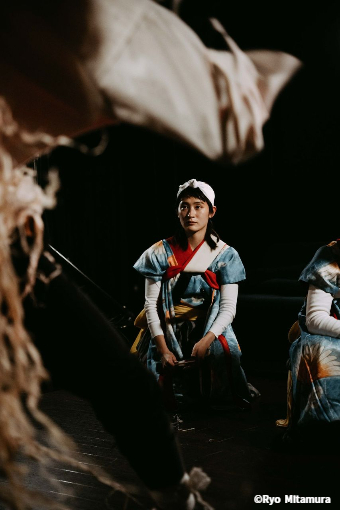 KOM_I doing the Hariyama Shishi Odori at "Tono Meguritoroge"
KOM_I doing the Hariyama Shishi Odori at "Tono Meguritoroge" - ── I understand you were raised in a New Town, a dormitory-style residential district, in Kawasaki City. Perhaps life in such a new type of area is what led to your interest in different societies and history.
- I think so. I think it's beautiful to see songs and dances being passed on, and I feel like I am sharing in a part of the community's roots by visiting with the people, although I do sometimes feel bad for being an outsider pushing my way in. But the first thing my Shishi Odori teacher told me was that no matter who you are or where you are from, anyone who wants to learn has the right to inherit Shishi Odori, and so I was happy that she took me under her wing. There was a woman born and bred in Tokyo who used to teach me other dances, such as the one performed at the Owara Kaze no Bon*3, and she gifted me a kimono with her family crest on it, saying that it was sitting locked away in a drawer and there was no-one in her family to wear it and she thought it would look good on me. It was a symbolic event. I think there are going to be more and more ways for people to pass on their skills and traditions to others who are not related by blood or family ties.
- ── Connections that don't depend on blood ties and co-existing with more than just inclusion; I think that's something important to consider with regard to diversity as well.
- It's interesting to note that this is something that can cross countries too. I've been talking about the things I study only every so often, but one thing I'm particularly passionate about is classical Indian music. My teacher is younger than me at 26 years old.
- ── So you're being taught by someone your junior.
- She's like a friend to me. Her singing skills are solid, and she has quite a grandmotherly feel about her. When we first started our lessons together I asked her if there were any rules I had to abide by as her student, and she told me "Loyalty towards the music. That is all." Can you imagine? A woman in her 20s said that!
She lets me stay at her place when I'm traveling in India. She has all sorts of life advice, like where to eat and sleep, so in that sense she's like a grandmother to me. I guess what I'm saying is that while she may be my teacher, she's also someone I really like and is someone I can share my life with. I think that's important. Sometimes I wonder whether I'm with her to learn a new skill or simply because I want to spend time with her. We may not be related by blood, but it really does feel like we are family. It's that strong attachment to community, like those traveling performance groups who hone their craft together.
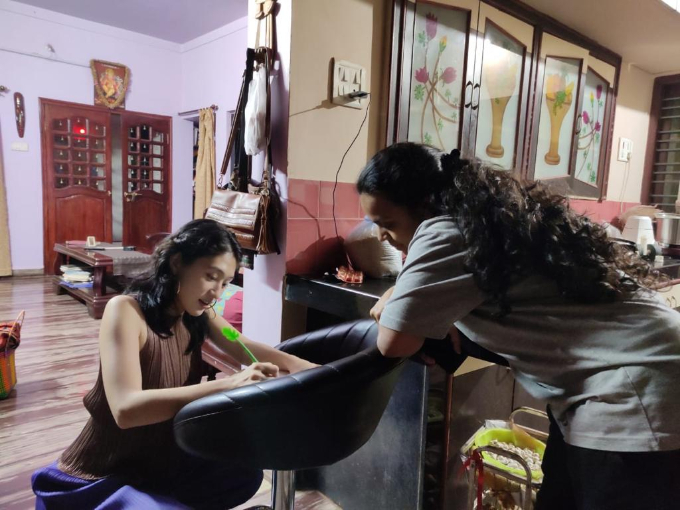 KOM_I with her classical Indian music teacher, who she sees as a grandmother figure
KOM_I with her classical Indian music teacher, who she sees as a grandmother figure - ── I get the sense that you're openly branching out to all sorts of places and communities around the world. Will you keep doing this, or do you think you will eventually settle down in one place?
-
There are things like classical Indian music that I can see myself doing for a long time, and someday, somewhere, I might narrow them down. But I know it's not in my nature to just focus on one thing, so I've mostly given up on the idea of settling down.
But I'm a wanderer; I want to be that person who comes to visit with a breath of fresh air. Even if I were to hone in on something and specialize, I don't think I'd ever equal others as it stands. But it's not always about winning, is it? (laughs)
I recently performed with the Kyoto-based Antibodies Collective. They are a group of people who come from all sorts of different backgrounds and occupations, and I fit in seamlessly with my various roles of singing, dancing, and acting. That's what I want to be; the person that no-one else can imitate. I'm hoping that my originality and my personality can rise above as a result of being involved in and changing from a variety of activities. At least that's what I hope will happen.
- ── You've been an active participant in research-based projects in addition to your exploration of the classical arts these past few years. You've visited various communities in Tokyo and spoken with immigrants. What sort of experiences do you gain from these?
- I mean, I just like hearing peoples' stories. There are a lot of resources out there to learn about new things, such as the Internet, books, and movies. But research is not my forte, which is why I tend to go out and actually talk to people.
As a wanderer myself, I have been to all sorts of places and I've received warm welcomes in different countries and regions, so I'm curious to see how immigrants view life in Japan. During my travels I've had men say "Welcome to India!" as they pass me on the street, and I've had crowds of people help me with my luggage after getting on the wrong train. I've been saved by the kindness of strangers on multiple occasions, and I wonder if we do the same for people who have come to Japan.
- ── Do you ever run into any trouble when diving into a new community?
-
Not really. My parents are extremely well-traveled and they'd taken me to more than 10 countries since before I can remember. That may be why I feel comfortable around the smells and the atmosphere of different cultures.
I must say that I fare better in Asia than I do in the developed world like Europe. I want to learn about Asian cultures, and all the festivals I want to go to are in Asia. I'm enchanted by the psychedelic and bustling Asian world. I'm sure Japan used to be similar until only recently. I think it was perhaps during the Meiji period or even around the end of the war in 1945 when we became more formal and stuffy like we are today. When I see the shamans in Indonesia going into their trances at the festivals, or when I see Indian people dancing and making offerings to the gods, it makes me think that Japan must have had this too. That's why I find Asia so interesting and I have no qualms about going there. By the third day I'm already fully adjusted to the area. It's as if I can adapt as fast as an amoeba! (laughs)
- ── Does this mean that you naturally get along well with the foreigners you meet in Japan?
- Well, we tend to meet through some kind of project or event, so in that sense it's often the case that we meet for work purposes. But it's just as important to spend time together outside of work purposes. Just like with studying classical arts, we get to know each other's habits and perspectives on life by grabbing lunch together and having a chat. It's something we go through together, and I think that sort of undercurrent of empathy towards the other person is what gives rise to a deeper relationship.
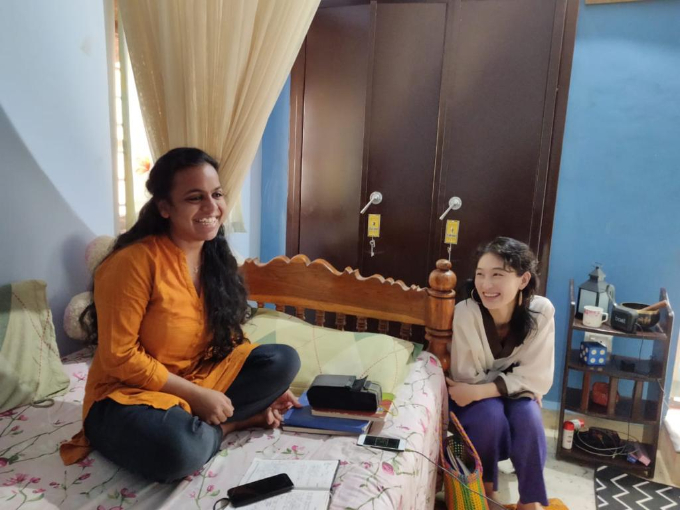 KOM_I strengthens her relationship by spending time with her teacher outside of the student/teacher relationship
KOM_I strengthens her relationship by spending time with her teacher outside of the student/teacher relationship - ── Japan started to push the usage of the words "diversity" and "inclusion" in preparation for the 2020 Tokyo Olympics, but it's difficult to put these words into effect because they mean different things to different people. How do you see diversity in its most ideal form?
-
You know, it's difficult to say. Although I have a lot of different interests, those interests are confined to performing arts and the study of folklore. If you were to ask me whether I consider myself to be a person of diversity, I would say that I have a biased point of view about life.
Still, a vague response of "Yeah, diversity is good," isn't worth much, is it? Lately I've been thinking that it's really important for people to be able to disagree with and criticize each other. You're only lying if you say you agree with something and you never speak up about the fact that you actually take issue with it. Ideally, people should be able to coexist with others who have different ideas, even when they clash with those ideas.
It's the same with singing and dancing. Of course I have to choose my words based on the timing and how the other person is going, but I also want to have a full understanding of it all. That's why I'll make comments and share my opinions. Maybe it's because I'm female, but I'm very good at fitting in with the community by tuning into it. But because I'm so good at fitting in, I feel like my only option is to completely withdraw whenever I feel like I've gotten it wrong. I recognize this within myself, and that's why I'd like to become better at building relationships where we can disagree and discuss things with each other.
- ── I get where you're coming from because I too have this black and white thinking part of me. It would be good to be able to recognize that there are many shades of gray within people in society and that we can disagree and live alongside each other if we just tune into those shades.
- Have you seen that movie about Mishima Yukio and the Zenkyōtō (All-Campus Joint Struggle Councils)?
- ── You mean Mishima: The Last Debate, the documentary about the public debate between Mishima and the students at the University of Tokyo, Komaba Campus in 1969, right?
- I feel like that was a time when people could have different principles and still speak to each other with a bit of humor mixed in. Sure there was conflict, but I feel like both sides were able to move forward. The ability to critique healthily nurtures a sense of inquiry, but Japanese people are just terrible at it, aren't they? They feel like any sort of critique is the end of the world.
- ── Like critiquing one topic tends to be taken as a personal attack to which the person completely shuts down?
-
The person doing the critiquing needs to have a positive attitude, but the person being critiqued also probably needs to have a positive attitude, too. You need to be able to listen to advice and use it to help you grow, and use people's animosity toward you as an opportunity to help guide you toward personal improvement.
What I love about the arts community is that we have a reason to connect and reconnect within our modern society. We meet up as friends and we also discuss each other's art. Things can get a bit contentious at times when we start getting into critiques and the like, but we can overcome those clashes because we all respect one another. That is what I love most about the world of performing arts.
- *1 DOMMUNE: A live streaming studio and channel. Click here for a trailer for "Tono Meguritoroge" https://www.dommune.com/streamings/2021/121501/
- *2 Nanba walking: Walking with the right arm swinging with the right leg, and the left arm swinging with the left leg
- *3 Owara Kaze no Bon: An event of traditional song and dance held every year from September 1 to 3 in Yatsuo, Toyama City
Related Articles
Back Issues
- 2025.12.19 Echoes of a War Unli…
- 2025.6.24 Exclusive Interview:…
- 2025.5. 1 Ukrainian-Japanese I…
- 2024.11. 1 Placed together, we …
- 2024.5.24 The 50th Japan Found…
- 2024.5.24 The 50th Japan Found…
- 2024.5. 2 People-to-People Exc…
- 2024.2.19 Movie Theaters aroun…
- 2024.2.19 Movie Theaters aroun…
- 2023.4.24 The 49th Japan Found…


